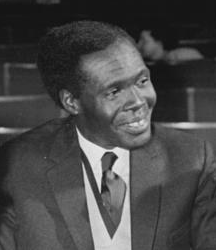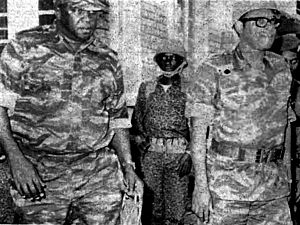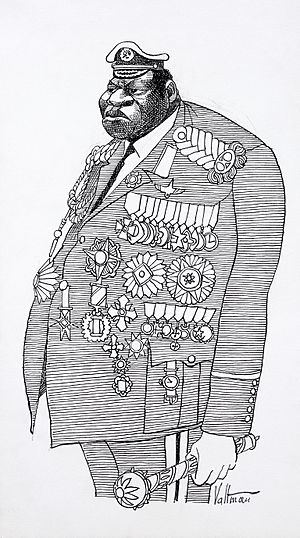Idi Amin facts for kids
Quick facts for kids
Idi Amin
|
|
|---|---|
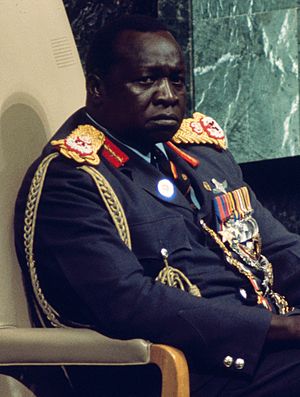
Amin shortly before addressing the United Nations General Assembly, 1975
|
|
| 3rd President of Uganda | |
| In office 25 January 1971 – 11 April 1979 |
|
| Vice President | Mustafa Adrisi |
| Preceded by | Milton Obote |
| Succeeded by | Yusuf Lule |
| Personal details | |
| Born |
Idi Amin Dada Oumee
c. 1925 Koboko, Uganda Protectorate |
| Died | 16 August 2003 (aged 77–78) Jeddah, Mecca, Saudi Arabia |
| Spouses | At least six, including:
Malyamu
(m. 1966; div. 1974)Kay
(m. 1966; div. 1974)Nora
(m. 1967; div. 1974)Madina
(m. 1972, Sarah Kyolaba
(m. 1975) |
| Children | 43 (claimed) |
| Relatives |
|
| Military service | |
| Allegiance |
|
| Branch/service |
|
| Rank |
|
| Commands | Commander-in-Chief of the Uganda Army |
| Battles/wars |
|
Idi Amin Dada Oumee (born around 1925 – died August 16, 2003) was a military officer and politician from Uganda. He served as the third President of Uganda from 1971 to 1979. He ruled as a military dictator. Many people consider him one of the most brutal leaders in modern history.
Amin was born in Koboko, in what is now northwest Uganda. In 1946, he joined the King's African Rifles (KAR). This was a part of the British Colonial Army. He started as a cook and rose to the rank of lieutenant. He helped the British in actions against rebels in Somalia and Kenya.
Uganda became independent from the United Kingdom in 1962. Amin stayed in the army. He became a major and was made commander of the Uganda Army in 1965. He learned that the Ugandan President, Milton Obote, planned to arrest him. So, Amin launched a military takeover in 1971 and declared himself president.
During his time in power, Amin changed his allies. At first, he had support from Israel and Western countries. Later, he was backed by Libya, Zaire, the Soviet Union, and East Germany. In 1972, Amin forced out many Asians from Uganda. Most of them were of Indian descent. This caused India to end its diplomatic ties with Uganda.
As Amin's rule continued, there was growing unhappiness. This was due to his treatment of certain groups and political opponents. Uganda's international standing also suffered. In 1978, he tried to take over a part of Tanzania. The Tanzanian president, Julius Nyerere, ordered his troops to invade Uganda in response. Tanzanian and rebel forces captured Kampala in 1979. They removed Amin from power. Amin went into exile, first in Libya, then Iraq, and finally in Saudi Arabia. He lived there until his death in 2003.
Amin's rule was known for many human rights abuses. These included political repression, ethnic persecution, and killings. There was also corruption and poor management of the economy. Experts believe that between 100,000 and 500,000 people were killed during his time as leader.
Contents
Early Life and Military Career
Where and When Was Idi Amin Born?
Idi Amin did not write about his own life. So, there are different ideas about when and where he was born. Most sources say he was born in Koboko or Kampala around 1925. Some say it was as early as 1923 or as late as 1928. His son, Hussein, said his father was born in Kampala in 1928.
Amin's father was Andreas Nyabire. He was from the Kakwa ethnic group. He became Muslim in 1910 and changed his name to Amin Dada. Idi Amin's mother was Assa Aatte. She was from the Lugbara ethnic group. She was a traditional herbalist.
Amin went to an Islamic school in Bombo in 1941. He left school after a few years. He had only a fourth-grade education in English. He did odd jobs before joining the army.
Joining the King's African Rifles
Amin joined the British King's African Rifles (KAR) in 1946. He started as an assistant cook. He also received military training. In 1947, he was sent to Kenya for infantry service. His unit fought against Somali rebels and later the Mau Mau rebels in Kenya. He was promoted to corporal in 1952 and sergeant in 1953.
In 1959, Amin reached the rank of Effendi class 2 (Warrant Officer). This was the highest rank a black African could achieve in the British colonial military then. He returned to Uganda the same year. In 1961, he became one of the first two Ugandans to become commissioned officers. He was tasked with stopping cattle theft between different groups in Uganda and Kenya.
Rising Through the Ranks
After Uganda gained independence in 1962, Amin was promoted to captain. In 1963, he became a major. He was made Deputy Commander of the Army in 1964. The next year, he became Commander of the Army. By 1970, he was the commander of all armed forces.
Amin was a good athlete. He was the Ugandan light heavyweight boxing champion from 1951 to 1960. He was also a swimmer and a strong rugby player.
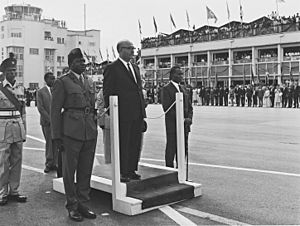
In 1965, Prime Minister Milton Obote and Amin were involved in a deal. They were accused of smuggling ivory and gold from the Democratic Republic of the Congo. In 1966, the Ugandan Parliament asked for an investigation. Obote then changed the constitution. He removed the ceremonial president, King Mutesa II of Buganda, and made himself executive president. Obote promoted Amin to colonel and army commander. Amin led an attack on the King's palace. The King was forced to leave Uganda.
Amin started recruiting soldiers from his own ethnic group, the Kakwa. He also recruited from the Lugbara and South Sudanese groups. Many of these soldiers were from the West Nile area.
Seizure of Power and Presidency
How Did Amin Become President?
Over time, problems grew between Amin and Obote. Amin had gained strong support within the army. He was also involved in helping rebels in southern Sudan. In October 1970, Obote took control of the armed forces. He reduced Amin's power.
Amin learned that Obote planned to arrest him. So, on January 25, 1971, Amin took power in a military coup. Obote was away at a meeting in Singapore. Troops loyal to Amin took control of the airport and Kampala. Amin announced on the radio that Obote's government was corrupt. People cheered in the streets of Kampala. Amin said the military government would only be temporary. He promised new elections and to free political prisoners.
In April 1971, Amin held a state funeral for Edward Mutesa. He was the former king of Buganda and president. Amin also freed many political prisoners. He repeated his promise for free elections.
Starting Military Rule
On February 2, 1971, Amin declared himself President of Uganda. He also became Commander-in-Chief of the Armed Forces. He suspended parts of the Ugandan constitution. He created an Advisory Defence Council made of military officers. Amin put military tribunals (military courts) above civil law. He appointed soldiers to important government jobs. Amin ruled by issuing decrees (official orders).
Amin renamed the presidential lodge "The Command Post". He replaced the old intelligence agency with the State Research Bureau (SRB). Other groups like the military police also helped him control the country.
Obote went to Tanzania for safety. The Tanzanian President, Julius Nyerere, offered him help. Many Ugandans also fled to Tanzania. In 1972, exiles tried to take back Uganda, but they failed.
Treatment of People in Uganda
Amin reacted to the attempted invasion by punishing those he saw as Obote's supporters. Many soldiers from the Acholi and Lango ethnic groups were killed. By early 1972, thousands of soldiers and civilians had disappeared. The victims included people from other groups, religious leaders, journalists, and students. Many others were killed for different reasons.
These killings continued throughout Amin's eight years in power. The exact number of people killed is not known. Groups like the International Commission of Jurists estimated that at least 80,000, and possibly around 300,000, people died. Some estimates go as high as 500,000.
Important people who were killed included Benedicto Kiwanuka, a former prime minister, and Janani Luwum, an archbishop.
Amin chose his followers from his own ethnic group, the Kakwas, and from South Sudanese people. By 1977, these groups held many top positions in the military and government. This helped Amin survive several attempts to remove him from power. Amin's army grew from 10,000 to 25,000 soldiers by 1978. Many of his soldiers were from South Sudan or Congo.
In August 1972, Amin declared an "economic war." This included taking over businesses owned by Asians and Europeans. Uganda had about 80,000 Asians. Most were from the Indian subcontinent and were born in Uganda. Their families had come to Uganda when India was a British colony. Many owned businesses that were very important to Uganda's economy.
On August 4, 1972, Amin ordered the expulsion of 50,000 Asians who held British passports. This order was later changed to include all 60,000 Asians who were not Ugandan citizens. About 30,000 Ugandan Asians moved to the UK. Others went to Canada, India, and other countries. Amin gave their businesses and properties to his supporters. However, without experienced owners, many businesses failed. This was very bad for Uganda's economy. Asians had paid 90% of the country's taxes. When they left, the government lost a lot of money, and the economy almost collapsed.
In 1975, Amin's finance minister, Emmanuel Blayo Wakhweya, left the country. In 1977, his health minister, Henry Kyemba, also left. Kyemba wrote a book called A State of Blood. It was one of the first books to describe Amin's rule from an insider's view.
On June 25, 1976, Amin was declared president for life.
Uganda's Relationships with Other Countries
At first, Western countries like Israel and Great Britain supported Amin. They were worried about Obote's policies, which included taking over British companies. They saw Amin as loyal to Britain.
In the first year of his presidency, Amin received military and financial help from the UK and Israel. But when they refused to give him advanced military equipment for free, Amin looked elsewhere. In February 1972, he visited Libya. Amin spoke against Zionism (support for Israel). In return, Libyan leader Muammar Gaddafi promised Uganda a large loan. Amin then removed Israeli military advisers and ended diplomatic relations with Israel.
After the expulsion of Asians in 1972, India ended its diplomatic ties with Uganda. Amin also broke ties with the United Kingdom and took over all British-owned businesses. Libya, the United States, and the Soviet Union started trading with Uganda instead.
The Soviet Union became Amin's biggest arms supplier. They sent Uganda tanks, jets, and missiles. By 1975, the Soviets had given Amin's government millions of dollars in aid and weapons. Amin also sent Ugandans to Eastern European countries for military training. East Germany was involved with Amin's intelligence agencies.
In June 1976, an Air France plane was hijacked and landed at Entebbe Airport in Uganda. The hijackers were joined by others. They released many non-Jewish hostages. But they kept 83 Jewish and Israeli citizens, along with 20 others who refused to leave them. Israeli commandos then launched a rescue mission called Operation Entebbe. On July 3-4, 1976, they took control of the airport and freed almost all the hostages. Three hostages died, and one Israeli soldier was killed. A fourth hostage, an elderly Jewish Englishwoman, was later murdered in revenge. This event further damaged Uganda's international relations. The United Kingdom closed its embassy in Uganda. Amin also ordered the killing of hundreds of Kenyans living in Uganda, as Kenya had helped in the raid.
Uganda increased its military power under Amin. This worried Kenya. In 1976, Amin claimed that parts of southern Sudan and western Kenya were historically part of Uganda. Kenya responded strongly, saying it would not give up any land. Amin backed down after the Kenyan army sent troops to the border.
Removal from Power and Exile
The War with Tanzania
In January 1977, Amin appointed General Mustafa Adrisi as Vice President. A split grew in the Uganda Army between Amin's supporters and those loyal to Adrisi. By 1978, Amin had fewer supporters. People in Uganda were unhappy as the economy and services collapsed. After some ministers were killed in 1977, several of Amin's ministers left the country. In early 1978, Adrisi was injured in a car accident. While he was away, Amin removed him from his positions. This angered Adrisi's followers.
In November 1978, troops loyal to Adrisi rebelled. Amin sent troops against them. Some rebels fled across the Tanzanian border. Fighting then broke out along the border. The Uganda Army invaded Tanzanian territory. Some say Amin ordered the invasion to distract from problems at home. Others say his troops acted without his direct orders, and he approved it later. Amin accused Tanzanian President Julius Nyerere of starting the war. He announced that Uganda had taken over a part of Tanzania called Kagera.
However, Tanzania prepared a counter-attack. Amin reportedly tried to end the conflict without losing face. He publicly suggested that he and Nyerere have a boxing match to decide the outcome. Nyerere ignored him.
In January 1979, Nyerere sent the Tanzania People's Defence Force into Uganda. They were joined by Ugandan exiles who formed the Uganda National Liberation Army (UNLA). Amin's army steadily retreated. He received military help from Libya and the PLO. Amin reportedly traveled to Saudi Arabia and Iraq to ask for more foreign support.
Amin was forced to flee Kampala by helicopter on April 11, 1979, when the city was captured. He tried to gather some remaining soldiers in eastern Uganda. He even declared Jinja his new capital. But he soon fled into exile.
Life in Exile
Amin first went to Libya. He stayed there until 1980. Then he settled in Saudi Arabia. The Saudi royal family gave him a safe place to live and paid him money. In return, he had to stay out of politics. Amin lived in a hotel in Jeddah for many years.
In 1989, Amin left Saudi Arabia without permission. He flew to Zaire with one of his sons. He planned to gather a rebel force to take back Uganda. But he was easily recognized at the airport and arrested. Saudi Arabia was upset that he had left without permission and refused to let him return at first. Zaire did not want to send him back to Uganda, where he faced murder charges. After appeals from the King of Morocco, Saudi Arabia finally allowed Amin to return. He promised not to be involved in politics or military activities again. He spent the rest of his life in Saudi Arabia.
In his final years, Amin reportedly ate only fruits. His daily eating of oranges earned him the nickname "Dr Jaffa" among Saudi Arabians.
Illness and Death
On July 19, 2003, Amin's fourth wife, Nalongo Madina, announced that he was in a coma. He was near death in a hospital in Jeddah, Saudi Arabia, due to kidney failure. She asked the Ugandan president, Yoweri Museveni, to allow him to return to Uganda. Museveni said Amin would have to "answer for his sins" if he came back. Amin's family decided to turn off his life support. Amin died at the hospital in Jeddah on August 16, 2003. He was buried in a simple grave in Ruwais Cemetery in Jeddah.
Family and Character
Amin's Family Life
Idi Amin had many wives. He married at least six women, and divorced three of them. He married Malyamu and Kay in 1966, and Nora in 1967. In 1972, he married Nalongo Madina. In 1974, he announced he had divorced Malyamu, Nora, and Kay. Kay Amin died in mysterious circumstances in 1974.
In July 1975, Amin had a big wedding to 19-year-old Sarah Kyolaba. The wedding happened during a meeting of African leaders in Kampala. The leader of the PLO, Yasser Arafat, was Amin's best man. Sarah was a hairdresser. She and Amin had four children. Sarah died in 2015.
By 1993, Amin was living with nine of his children and one wife. His last known child, Iman, was born in 1992. Amin reportedly married again a few months before his death in 2003.
Amin had as many as 60 children. His eldest son, Taban Amin (born 1955), was a leader of a rebel group. In 2005, he was offered amnesty by the Ugandan government. In 2006, he was given a government position. Another son, Jaffar Amin (born 1967), has spoken out to defend his father. He said he was writing a book to improve his father's reputation.
Nicknames and Public Image
Amin had many nicknames, some of them negative. People called him "Big Daddy," "Butcher of Uganda," and "Black Hitler." The name "Dada" might have been part of his family name or a nickname. In Saudi Arabia, he was called "Dr. Jaffa" because he ate so many oranges.
As time went on, Amin's behavior became more unusual. After the United Kingdom ended diplomatic relations in 1977, Amin said he had defeated the British. He gave himself the title "CBE" (Conqueror of the British Empire). His full self-given title eventually became very long. It included "His Excellency, President for Life, Field Marshal Al Hadji Doctor Idi Amin Dada, VC, DSO, MC, CBE, Lord of All the Beasts of the Earth and Fishes of the Seas and Conqueror of the British Empire in Africa in General and Uganda in Particular." He also claimed to be the uncrowned king of Scotland. He never actually received the DSO or MC medals. He gave himself a doctorate degree from Makerere University.
Outside Uganda, the media often showed Amin as a funny and strange person. Some movies showed his clownish side. But Ugandan exiles often criticized this. They felt the media focused too much on his odd behavior and not enough on the terrible things he did. Some thought Amin might have acted eccentric on purpose to make other countries less worried about his rule.
Legacy
Historians say that the strong military culture in Uganda is one of Amin's lasting impacts. His reputation in Uganda is more complicated than in other countries. Some Ugandans have praised him as a "patriot." They supported his decision to expel Asians from the country. At the time of his death, he was well-regarded in northwest Uganda. One of Amin's sons, Jaffar Remo, has asked for an investigation into the abuses during his father's rule.
Images for kids
-
Remnants of Amin's palace near Lake Victoria
See also
 In Spanish: Idi Amin para niños
In Spanish: Idi Amin para niños
 | Charles R. Drew |
 | Benjamin Banneker |
 | Jane C. Wright |
 | Roger Arliner Young |


